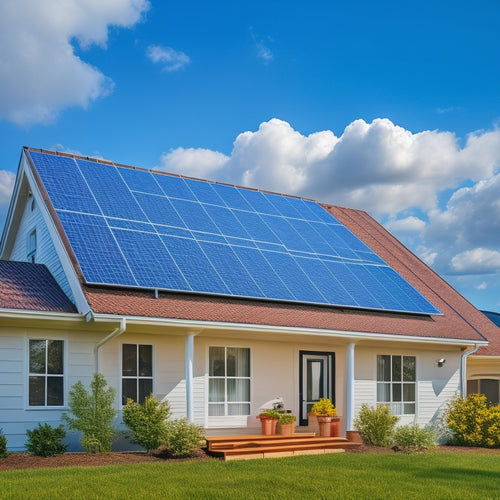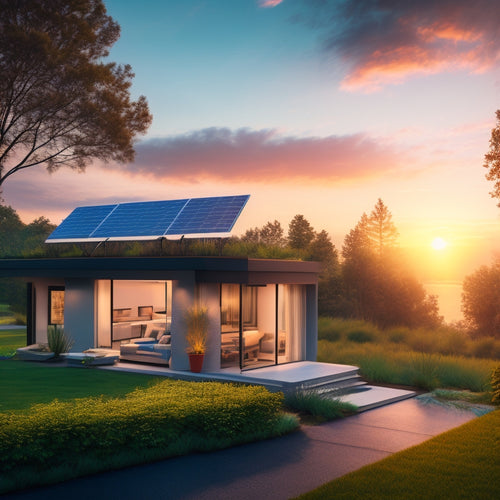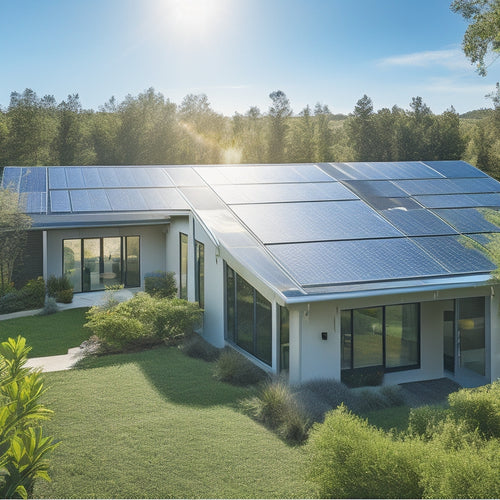
Cost to Get Solar Panels Installed
Share
As you consider installing solar panels, you're likely wondering about the cost. The average cost of getting solar panels installed ranges from $15,000 to $30,000, depending on your roof size, inverter efficiency, and government incentives. Installing solar panels can enhance your property value by up to $15,000 and increase your home's sale price by up to 17%. You'll also save money on utility bills, with long-term savings accumulating to thousands of dollars. To get a better understanding of the costs and benefits, let's break down the factors that affect the installation process.
The Essentials
- Installing solar panels can increase property value by up to $15,000, according to the National Renewable Energy Laboratory.
- Solar panel systems generate electricity, leading to immediate savings on utility bills and reducing energy costs.
- Inverter efficiency ratings range from 90% to 98%, impacting system performance, and a 1% efficiency difference can lead to significant energy output variations.
- Government incentives, such as the Solar Investment Tax Credit, allow claiming 26% of installation costs against federal taxes, reducing the overall cost.
- Roof size and orientation considerations, including accurate measurements and shading analysis, are crucial for determining solar panel installation feasibility and cost.
Boost Property Value Fast
By installing solar panels, you can experience a significant rise in your property's worth, making it more attractive to potential buyers.
This, in turn, can increase your home's sale price, providing a substantial return on investment. In fact, studies have shown that solar-powered homes sell for up to 17% more than their non-solar counterparts.
Rise in Property Worth
Your decision to install solar panels can considerably enhance your property's value, making it more attractive to potential buyers if you decide to sell in the future. In fact, a study by the National Renewable Energy Laboratory found that solar panels can increase your property's value by up to $15,000.
This is because solar panels are seen as a desirable feature, especially in areas with high energy costs. As the solar market trends continue to shift towards renewable energy, having solar panels installed can give you a competitive edge over other properties on the market.
By investing in these innovative technologies, homeowners can tackle three major concerns at once, including reducing their electricity bills and carbon footprint. When it comes to property appraisal, solar panels are considered a permanent improvement, which means they're factored into the overall value of your property.
This is because they provide a tangible benefit to the homeowner, reducing energy costs and increasing the property's appeal. By installing solar panels, you're not only reducing your carbon footprint but also making a smart investment in your property's future.
As you consider the cost of solar panel installation, remember that the long-term benefits, including the rise in property worth, can far outweigh the initial investment.
Increase Home's Sale Price
One of the most significant advantages of solar panel installation is its potential to enhance your home's sale price. As you consider investing in solar energy, you're likely thinking about the long-term benefits, including the impact on your property's value.
With solar panels, you can increase your home's appeal to potential buyers, making it more attractive in a competitive market. By installing rooftop solar panels, you can also raise your home's energy efficiency and reduce your reliance on the grid, which is a major selling point for eco-conscious buyers solar roofing.
Additionally, solar panels can increase your home's value and appeal, making it a more attractive selling point should you decide to move.
According to market trends, homes with solar panels tend to sell faster and for a higher price than those without. In fact, a study by the National Renewable Energy Laboratory found that solar panels can increase your home's value by up to $15,000.
This increase in value is largely due to the homebuyer appeal of solar energy, which is seen as a desirable feature in today's eco-conscious market.
Save Money on Bills
You'll start saving money on your utility bills as soon as your solar panel system is installed, since you'll be generating your own electricity.
By utilizing the sun's energy, you'll lower your expenses and reduce your reliance on the grid, leading to significant reductions in your energy costs.
With residential solar panels and efficient photovoltaic cells, homeowners can maximize their energy generation and savings.
Over time, these savings can add up to thousands of dollars, making your investment in solar panels a smart financial move.
Lower Your Expenses
By switching to solar power, households can greatly reduce their reliance on the grid, thereby slashing their electricity bills.
You'll be generating your own clean energy, and that means you'll be paying less to your utility company each month. Depending on your energy usage and the size of your solar panel system, you could save hundreds or even thousands of dollars per year.
When you opt for solar power, you'll also save on maintenance costs in the long run.
Solar panels require very little upkeep, and they're designed to last for decades. That means you won't have to worry about frequent repairs or replacements, which can be a significant cost savings over time.
You have several installation options to choose from, including rooftop solar panels or a ground-mounted system.
Regardless of which option you choose, you'll be reducing your reliance on the grid and saving money on your energy bills. By utilizing the power of the sun, you'll be taking control of your energy costs and enjoying the freedom that comes with it.
Reduce Energy Costs
Generating your own clean energy means a significant decrease in your electricity bills. With solar panels, you'll reduce your reliance on the grid and lower your energy costs. This translates to more money in your pocket, giving you greater financial freedom.
By utilizing the power of the sun, you'll reduce your energy consumption from traditional sources. This leads to a substantial decrease in your electricity bills, allowing you to allocate your resources elsewhere.
With solar panels, you'll enjoy a predictable energy cost, shielding you from unpredictable price hikes.
As you reduce your energy costs, you'll also minimize your environmental impact. Solar energy is a clean and renewable source, producing no emissions or pollution.
This means you'll be contributing less to climate change, preserving the planet for future generations.
Inverter Efficiency Ratings Matter
When selecting a solar panel inverter, you'll encounter different types, including string, micro, and power optimizers, each with its own efficiency strengths and weaknesses.
For instance, inverters paired with home battery storage solutions can greatly enhance your system's overall performance.
To make an informed decision, you need to understand the efficiency rating scale, which ranges from 90% to 98%, and how it affects your system's overall performance.
Inverter Type Comparison
Your solar panel system's performance hinges on the inverter, an essential component that converts DC power into usable AC electricity for your home. When choosing an inverter, you'll encounter three main types: string inverters, microinverters, and power optimizers. Each has its strengths and weaknesses.
String inverters are the most common, offering a cost-effective solution, but they can be less efficient if one panel is shaded. Microinverters, on the other hand, provide maximum flexibility and monitoring capabilities, but are generally more expensive. Power optimizers offer a middle ground, optimizing energy production at the panel level while being more affordable than microinverters.
When selecting an inverter, consider the inverter lifespan, which typically ranges from 10 to 25 years, depending on the type and quality. A longer inverter lifespan means fewer replacement costs and more energy savings over time.
Additionally, look for inverters with a proven track record of reliability and durability to guarantee your solar panel system operates at its best. By understanding the differences between inverter types and their lifespans, you can make an informed decision that meets your energy needs and budget.
Efficiency Rating Scale
In selecting the right inverter for your solar panel system, you've likely thought about factors like type, lifespan, and reliability. However, another vital aspect to take into account is the efficiency rating scale.
Inverter efficiency ratings matter because they directly impact your solar panel efficiency and overall energy conversion efficiency. The efficiency rating scale is usually measured in percentage terms, with higher ratings indicating better performance.
The most efficient inverters can achieve ratings of up to 99%, while lower-end models may hover around 90%. A 1% difference in efficiency may seem insignificant, but it can translate to a substantial difference in energy output over the system's lifespan.
When evaluating inverters, look for the California Energy Commission (CEC) weighted efficiency rating, which provides a more accurate representation of real-world performance. A high-efficiency inverter can maximize your solar panel's energy output, reducing your reliance on the grid and increasing your energy independence.
Check Your Roof Size
You'll need to determine your roof's dimensions to guarantee a proper solar panel installation.
Measuring your roof's square footage is vital, as it directly affects the number of panels you can fit and the system's overall energy output.
When considering residential solar panels, it's important to assess your energy needs and roof size to maximize your investment.
Roof Dimensions Matter
Measure up: roof dimensions play an essential role in determining the suitability of your home for solar panel installation. When evaluating your roof's dimensions, consider the roof orientation, which affects the amount of sunlight your solar panels will receive. A south-facing roof is ideal, but east- and west-facing roofs can also work well. Avoid north-facing roofs, as they receive minimal sunlight.
| Roof Dimension | Considerations |
|---|---|
| Roof Orientation | South-facing ideal, east- and west-facing acceptable, north-facing unsuitable |
| Roof Size | Larger roofs can accommodate more panels, increasing energy output |
| Shading Analysis | Identify areas with shading from trees, chimneys, or other obstructions |
| Roof Pitch | Steeper roofs may require specialized mounting systems |
| Obstacles | Consider vents, skylights, and other features that may impact panel placement |
Your roof's dimensions will also impact the number of solar panels you can install. Larger roofs can accommodate more panels, increasing energy output. However, shading analysis is essential to identify areas with limited sunlight. By considering these factors, you can determine the best solar panel installation for your home.
Measuring Roof Square Footage
Your roof's square footage is a critical factor in determining how many solar panels you can install and how much energy you can generate. To accurately measure your roof's square footage, you'll need to take into account its dimensions, including the length, width, and any obstructions like skylights, vents, or chimneys.
Start by measuring the length and width of each section of your roof, taking note of any areas that can't accommodate solar panels. Calculate the square footage of each section by multiplying the length by the width. Add up the square footage of each section to get your total roof square footage.
When measuring your roof, consider the placement of solar panels. You'll want to identify areas that receive the most sunlight and are free from obstructions. Keep in mind that solar panels are typically installed in rows, so you'll need to guarantee there's enough space for the panels to fit comfortably.
Accurate roof measurements are essential for determining the ideal solar panel placement and guaranteeing you get the most out of your solar energy system.
Government Incentives Outshine Fossil
You'll be pleased to know that the government is offering incentives to encourage the adoption of solar energy, and you can benefit from them.
The Solar Energy Tax Credits, for instance, allow you to claim a considerable percentage of your solar panel installation costs as a tax credit.
Solar Energy Tax Credits
The federal government offers considerable solar energy tax credits to homeowners and businesses that invest in solar panel installations, creating a substantial financial incentive to shift away from fossil fuels.
As you consider going solar, you'll want to understand these tax credit benefits. The Solar Investment Tax Credit (ITC) allows you to claim a credit of 26% of the total cost of your solar panel installation against your federal income taxes. This can greatly reduce your tax liability, making solar energy more affordable.
You can claim the ITC for the tax year in which your solar panel installation is complete. For example, if you install your solar panels in 2023, you can claim the credit on your 2023 tax return.
The ITC can be carried over for up to five years if you can't use the full credit in one year. By taking advantage of these tax credits, you can enjoy the freedom to generate your own clean energy while reducing your reliance on fossil fuels and saving money on your taxes.
Frequently Asked Questions
Can I Install Solar Panels on a Rented Property?
You can install solar panels on a rented property, but you'll need to review your rental agreements and obtain your landlord's explicit permission, ensuring you understand the terms and responsibilities for installation, maintenance, and potential removal.
How Long Does a Typical Solar Panel Installation Take?
You're probably wondering if you'll be waiting forever for your solar panels to be installed. Don't worry, the typical installation timeline takes around 2-5 days, depending on installation factors like roof size and complexity, so you'll be utilizing free energy in no time!
Are Solar Panels Resistant to Extreme Weather Conditions?
You're probably wondering if solar panels can withstand harsh weather conditions. Rest guaranteed, they're designed to be durable and perform well in extreme weather, with most manufacturers testing their solar panels to confirm they can resist heavy snow, strong winds, and intense hail.
Can I Monitor My Solar Panel System's Performance Remotely?
Just like a captain maneuvers through turbulent seas, you can steer your solar panel system's performance from afar, using remote monitoring and performance tracking tools, giving you the freedom to optimize energy production and reduce carbon footprint.
Do Solar Panels Require Regular Maintenance or Cleaning?
You'll want to perform regular solar panel upkeep to guarantee peak energy output; cleaning frequency depends on your location, but generally, you'll need to clean them every 6-12 months to remove dirt and debris that can reduce efficiency.
Final Thoughts
As you weigh the cost to get solar panels installed, remember that it's an investment that will pay dividends for years to come. Think of it like planting a tree - it may take some time to grow, but once it does, it'll provide shade and fruit for a lifetime. With enhanced property value, lower energy bills, and government incentives, the benefits of solar panels far outweigh the initial cost. So, take the first step towards utilizing the power of the sun and watch your savings grow.
Related Posts
-

Cost of Solar Panel Installation
You can expect to pay between $15,000 and $30,000 or more for a typical solar panel installation, depending on the sy...
-

The Future of Residential Energy Storage
The future of residential energy storage looks promising and cost-effective for you. With lithium-ion battery prices ...
-

Installing Metal Solar Roofs for Maximum Energy Efficiency
Installing metal solar roofs can drastically enhance your home's energy efficiency and durability. These roofs withst...


